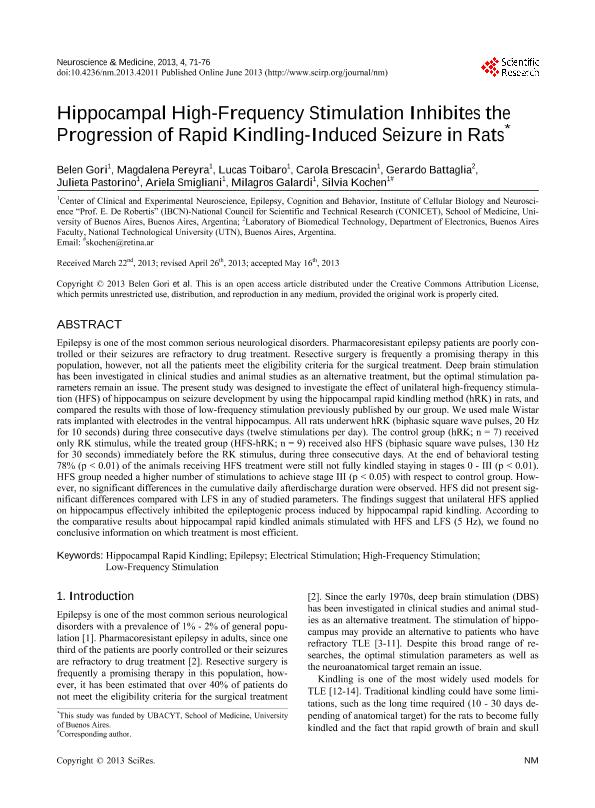Artículo
Hippocampal high-frequency stimulation inhibites the progression of rapid kindling-induced seizure in rats
Gori, María Belén ; Pereyra, Magdalena
; Pereyra, Magdalena ; Toibaro, Lucas; Brescacin, Carola; Battaglia, Gerardo Ángel; Pastorino, Julieta; Smigliani, Ariela; Galardi, Milagros; Kochen, Silvia
; Toibaro, Lucas; Brescacin, Carola; Battaglia, Gerardo Ángel; Pastorino, Julieta; Smigliani, Ariela; Galardi, Milagros; Kochen, Silvia
 ; Pereyra, Magdalena
; Pereyra, Magdalena ; Toibaro, Lucas; Brescacin, Carola; Battaglia, Gerardo Ángel; Pastorino, Julieta; Smigliani, Ariela; Galardi, Milagros; Kochen, Silvia
; Toibaro, Lucas; Brescacin, Carola; Battaglia, Gerardo Ángel; Pastorino, Julieta; Smigliani, Ariela; Galardi, Milagros; Kochen, Silvia
Fecha de publicación:
06/2013
Editorial:
Academic Journals
Revista:
Scientific Research And Essays
ISSN:
1992-2248
Idioma:
Inglés
Tipo de recurso:
Artículo publicado
Clasificación temática:
Resumen
Epilepsy is one of the most common serious neurological disorders. Pharmacoresistant epilepsy patients are poorly con-trolled or their seizures are refractory to drug treatment. Resective surgery is frequently a promising therapy in this population, however, not all the patients meet the eligibility criteria for the surgical treatment. Deep brain stimulation has been investigated in clinical studies and animal studies as an alternative treatment, but the optimal stimulation pa- rameters remain an issue. The present study was designed to investigate the effect of unilateral high-frequency stimula- tion (HFS) of hippocampus on seizure development by using the hippocampal rapid kindling method (hRK) in rats, and compared the results with those of low-frequency stimulation previously published by our group. We used male Wistar rats implanted with electrodes in the ventral hippocampus. All rats underwent hRK (biphasic square wave pulses, 20 Hz for 10 seconds) during three consecutive days (twelve stimulations per day). The control group (hRK; n = 7) received only RK stimulus, while the treated group (HFS-hRK; n = 9) received also HFS (biphasic square wave pulses, 130 Hz for 30 seconds) immediately before the RK stimulus, during three consecutive days. At the end of behavioral testing 78% (p < 0.01) of the animals receiving HFS treatment were still not fully kindled staying in stages 0 - III (p < 0.01). HFS group needed a higher number of stimulations to achieve stage III (p < 0.05) with respect to control group. How- ever, no significant differences in the cumulative daily afterdischarge duration were observed. HFS did not present sig- nificant differences compared with LFS in any of studied parameters. The findings suggest that unilateral HFS applied on hippocampus effectively inhibited the epileptogenic process induced by hippocampal rapid kindling. According to the comparative results about hippocampal rapid kindled animals stimulated with HFS and LFS (5 Hz), we found no conclusive information on which treatment is most efficient.
Archivos asociados
Licencia
Identificadores
Colecciones
Articulos(IBCN)
Articulos de INST.DE BIOLO.CEL.Y NEURCS."PROF.E.DE ROBERTIS"
Articulos de INST.DE BIOLO.CEL.Y NEURCS."PROF.E.DE ROBERTIS"
Citación
Gori, María Belén; Pereyra, Magdalena; Toibaro, Lucas; Brescacin, Carola; Battaglia, Gerardo Ángel; et al.; Hippocampal high-frequency stimulation inhibites the progression of rapid kindling-induced seizure in rats; Academic Journals; Scientific Research And Essays; 2013; 4; 6-2013; 71-76
Compartir
Altmétricas



